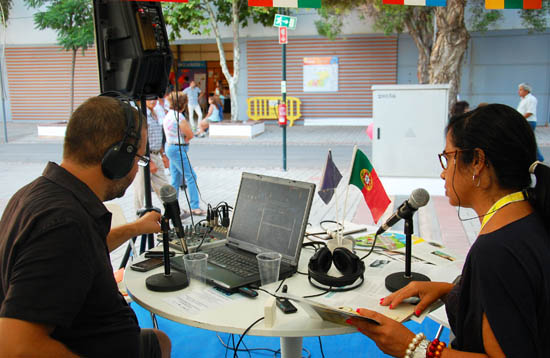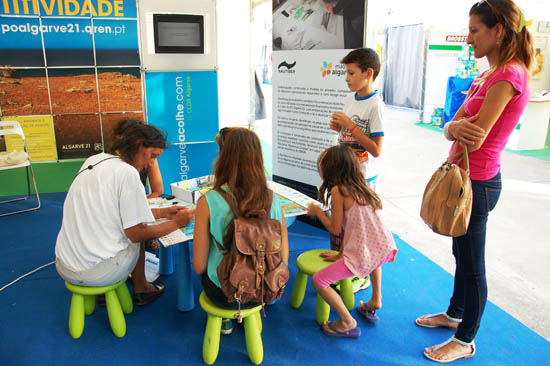 Cross-border cooperation and Descubriter, a tourist project about the Discoveries that unites the Algarve and Andalusia, are the topics highlighted today on the stand of the Regional Coordination and Development Commission (CCDR) at FATACIL.
Cross-border cooperation and Descubriter, a tourist project about the Discoveries that unites the Algarve and Andalusia, are the topics highlighted today on the stand of the Regional Coordination and Development Commission (CCDR) at FATACIL.
In focus, for an hour, between 19pm and 20pm, to talk about these themes, will be Catarina Cruz and Susana Faísca, from CCDRA, and Rui Parreira, from the Regional Directorate of Culture, as special guests, who will be interviewed live at Algarve University Radio (RUA FM), by journalists Elisabete Rodrigues and Pedro Duarte.
Yesterday, on the first day of these special programmes, Catarina Cruz, responsible for the Center Europe Direct (CED) Algarve, spoke about the work of this body that works in the CCDRA, while Ana Paula Lopes, from CED, hosted a game about Europe and its seas, in which children and young visitors to FATACIL participated. As a reward, the kids received an entry to Zoomarine, another to Slide&Splash and even a surf lesson.
Catarina Cruz underlined, in the live interview for RUA FM, that «one of the concerns of the Europe Direct Center is to convey to citizens that, in addition to being Portuguese, we are citizens of Europe».
That responsible also discussed the "advantages of the fact that we are all Europeans". Erasmus for student mobility, Interrail, the European health card, being able to work in Europe, the price of roaming, the fact that you don't need to use a passport to travel are just some of the advantages of being a member of the Union European.
 Catarina Cruz also spoke about some of the myths that were created about alleged prohibitions imposed by the EU and whose demystification led to the publication of a book. "There are a number of negative ideas about the European Union, which must be demystified", he stressed.
Catarina Cruz also spoke about some of the myths that were created about alleged prohibitions imposed by the EU and whose demystification led to the publication of a book. "There are a number of negative ideas about the European Union, which must be demystified", he stressed.
Which? For example, the EU did not prohibit the sale of Berlin Balls on beaches, and it was the ASAE that started to demand hygiene conditions in the preparation and sale of these sweets. But there are many more myths, which are well explained in a book that, at the CCDRA stand at FATACIL, can be obtained for free.
Ana Paula Lopes, on the other hand, stressed that CED has sought to encourage many activities “towards the youngest”. And are young people interested in knowing more about Europe? “You have to be very proactive and find information about Europe. Young adults, particularly university students, when they get the information, even reveal a lot of curiosity». In order to reach all these audiences, “we have been trying to involve associations, to try to reach young people more easily”.
For this promoter of the CED, “young people are now more interested in European issues. It all depends on how the information is offered. When you give a gift, it makes you want to open it if you have a nice bow. This is also the case with European information. The way in which the message is delivered, in a playful, happy and cheerful way, is very important and ends up transmitting the message better».
Precisely to demonstrate this playful way of transmitting information, yesterday at the end of the afternoon and beginning of the evening, at FATACIL, a game was held for young people between 6 and 16 years old. Guilherme and Beatriz, two of the kids who participated, also spoke with RUA FM, stressing that, on that day, they had learned that the blue flags on beaches are one of the advantages of countries in the European Union and that you cannot pollute the seas.
In conclusion, the head of the Europe Direct Center underlined that this body, despite being headquartered in Faro, reaches the entire Algarve region. “We are always an open door to the information that the citizen needs”, said Catarina Cruz.


















Comments